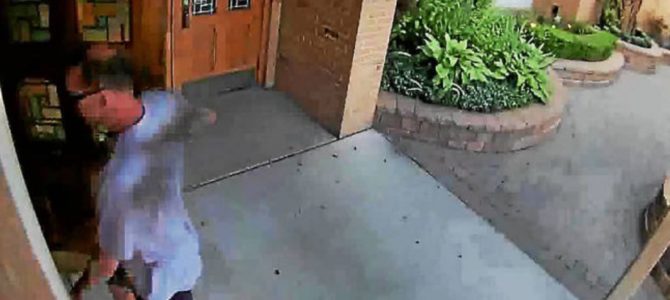A few weeks ago, when my husband returned home from work, his evening greeting struck a serious chord: “Did you hear what happened at Divine Child?” Divine Child is our Catholic parish church, located just a mile away.
I hadn’t, so he quickly explained that a man had set off explosives in the Adoration Chapel nestled just west of the church. He added that the website for our local news “paper” included a video from the security system.
That night after tucking our son into bed, I pulled up the story. More details had developed: The explosives were commercial-grade fireworks. Two women were praying before the Blessed Sacrament at the time but, while badly shaken, thankfully had not been hurt. Damage to the chapel was minimal, but this was not the first incident in the community. And security cameras had captured the entire event, providing a clear shot of the vandal entering and exiting the chapel, then fleeing in a bumper sticker-covered sedan.
Hoping to catch the suspect, police had released the security footage. After watching in horror as a clearly high-powered firework exploded in an extremely confined space—just a few feet from the kneeling parishioners—I turned to my husband condemning not just the evil deed, but the horrible man who would do such a thing.
The next morning news broke that, with the public’s assistance, police had succeeded in arresting the man believed responsible for the explosion. With that, I banished the event from my mind.
That is, until a couple of weeks later, when I read our parish bulletin: Our pastor, Father Jim Bilot, used his weekly column to update the congregation on the events of the last two weeks. He began with the basics for those unfamiliar with the incident. He then shared that following the man’s arrest, he had driven to the neighboring town in hopes of visiting the man in jail and assuring him of our prayers.
“How kind,” I thought, recalling my own failing in that regard. I had more than amply condemned the man, and not just his misdeed, although Christ (and my mother) had taught me to pray for those who would do us harm. But what our pastor wrote next left me even more distressed when recalling my earlier uncharitable reaction:
He is a decorated military man who served, I believe, 11 years in the military overseas and suffers from PTSD (post-traumatic stress disorder) [and TBI (‘Traumatic Brain Injury’)]. He is now on full disability. . . . The detective did state that the incident at our parish, though dangerous, would be the catalyst to move him through the system and into the VA so that he can get more intensive treatment. . . .Please pray for him and for all our men and women in the military. They give their lives in service to our country. I am saddened that this man has to suffer for the rest of his life because of the ravages of sin.
With these few sentences, our pastor brought to bear the meaning of Jesus’s words in the gospel message he had just proclaimed to his parish: “Then Peter took him aside and began to rebuke him, God forbid, Lord! No such thing shall ever happen to you.’ He turned and said to Peter, ‘Get behind me, Satan! You are an obstacle to me. You are thinking not as God does, but as human beings do.’”
In the end, the detective did not allow Father Bilot to visit the man because the incident had occurred at Bilot’s parish. But his pastoral visit was not in vain. Every member of the parish who read his words in good faith and saw in themselves, as I did, our failure to think as God does—and wishes us to do—will strive to do better next time. I know I will.









